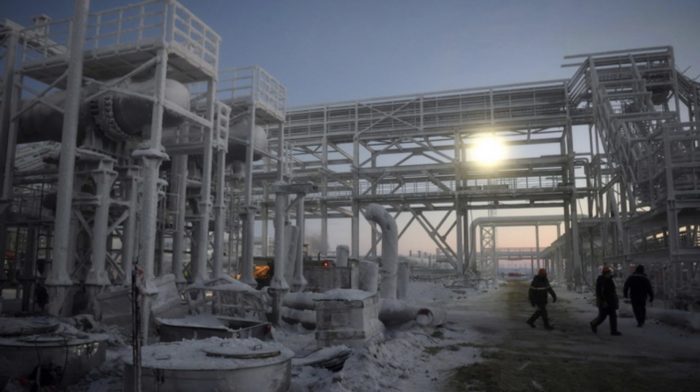Russia’s major gas project Arctic LNG-2 stalls under sanctions
Russia's $25 billion Arctic LNG-2 project has ceased operations after failing to secure buyers for its sanctioned gas production despite offering 40% discounts.


Russia’s Arctic LNG-2 project has halted operations due to sanctions-related sales difficulties, Bloomberg reports, citing sources familiar with the matter.
The $25 billion liquefied natural gas venture, launched by President Vladimir Putin in 2023, has been unable to sell any LNG shipments since August despite offering discounts of up to 40%.
“All ordered vessels of this type fell under restrictions, leaving the project without a transport solution, and attempts to resolve the situation failed,” explains oil and gas sector analyst Mikhail Krutihin in an interview with Voice of America’s Russian Service.
According to Bloomberg’s sources, the project’s production dropped by more than half in October compared to the previous month, with commercial gas liquefaction completely stopped. Only essential maintenance operations continue, according to the sources.
Arctic LNG-2, operated by Novatek, was meant to help Russia increase its global LNG market share from pre-war 8% to 20% by 2030. It has a planned capacity of 19.8 million tons per year across three production lines.
The sanctions have affected all project stakeholders, including France’s TotalEnergies and several Chinese and Japanese companies.
“Due to sanctions, they declared force majeure, stating that all contracts for gas purchases from Arctic LNG-2 are considered invalid,” Krutihin said.
The construction of the third production line has been postponed from 2026 to 2028. US Assistant Secretary of Energy Jeffrey Pyatt has indicated that his department closely monitors the movement of sanctioned Russian LNG, with the Biden administration maintaining a firm stance on this issue.
Read also:
- “War tax” on Russian LNG is key to starving Kremlin’s war chest
- UK imposes new sanctions on Russian LNG sector
- US lawmakers push for expedited LNG exports to Ukraine and Central Europe
You could close this page. Or you could join our community and help us produce more materials like this.
We keep our reporting open and accessible to everyone because we believe in the power of free information. This is why our small, cost-effective team depends on the support of readers like you to bring deliver timely news, quality analysis, and on-the-ground reports about Russia's war against Ukraine and Ukraine's struggle to build a democratic society.
A little bit goes a long way: for as little as the cost of one cup of coffee a month, you can help build bridges between Ukraine and the rest of the world, plus become a co-creator and vote for topics we should cover next. Become a patron or see other ways to support.



